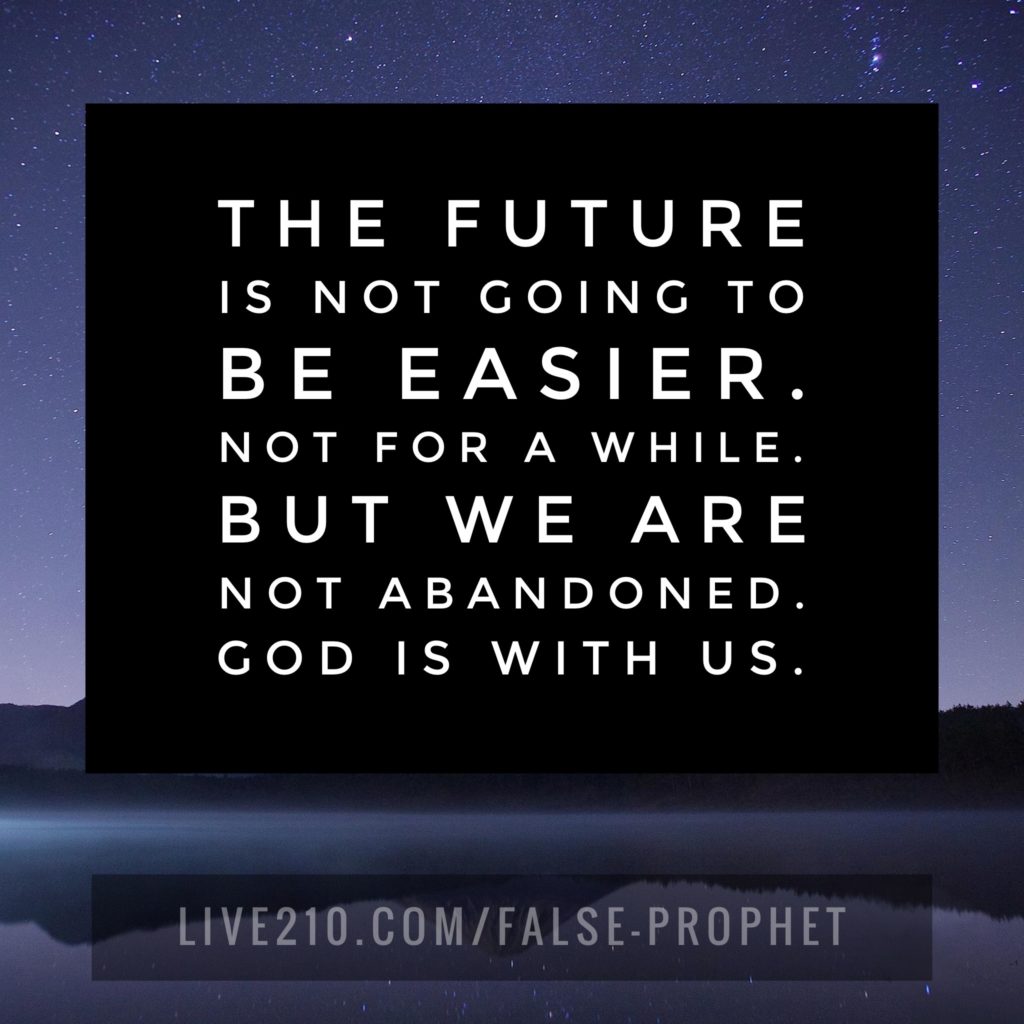8 min. to read.
Imagine two preachers coming to blows right in front of the congregation. The first preacher said hard words. The second preacher disagreed! He was so offended he kicked the podium over and took a swing.
Crazy picture? Unlikely? Well, that’s about what happened between Jeremiah and Hananiah, sometime around 580 BC. Even more strange? This absurd situation offers a challenging critique of what is happening in American Christianity today.
The story in question seems almost like an outtake from cable news with pundits yelling over each other. Why would two prophets be fighting? Some brief history will set the stage.
For generations, the tiny kingdom of Judah had lived in fear of the larger neighboring empires. Assyria had destroyed Israel. Babylon and Egypt were constant threats. Ten years before this prophet showdown (recorded in Jeremiah 27-28), Babylon laid siege to Jerusalem, looted the temple, and carried some of the leaders into exile. As they left, the Babylonian army installed a local politician named Zedekiah as a puppet king. Ten years into his reign, he and his counselors started plotting a secret alliance with Egypt to throw off their subjugation to Babylon. They wanted to know what the prophets would say. Was God on their side?
Jeremiah was one of the two prophets in this fight. His message was basically, “Egypt won’t save you. Even worse things are coming. Get right with God and prepare yourselves.” Not the kind of sermon folks like to hear! He was so convinced that Judah would be under Babylon’s yoke that he started wearing one around—a literal wooden ox yoke—to highlight his point.
The other prophet in this scene was Hananiah. When he heard Jeremiah’s message, he reacted. “No! Aren’t we God’s People? God is not going to let this terrible thing happen to us.” He even got specific. He told the king that within two years, Judah would triumph. Then he snatched the wooden yoke Jeremiah was wearing, shattering it on the ground. “Just as I’ve smashed this yoke, so God is going to smash Babylon”
Who would you believe?
Now, we know the outcome. We’ve got scripture and historical records. Babylon invaded a second time. Judah did not triumph. Jerusalem and the temple were destroyed. Many people were marched into an exile that would last generations. Knowing all of that, we read this passage as a weird episode between a Godly prophet and a wicked false prophet. But what if it wasn’t that clear?
Imagine, if you can, being in a situation where the life of your whole community is turned upside down. The plans you imagined for yourself and your children are ruined. On top of all that, there’s an enormous existential threat. People are going to die. The officials responsible for protecting you from such things have failed. They’ve made the wrong alliances. They’ve squandered the wealth of the nation. (I’m talking entirely about Judah in the 4th century BCE, I promise.)
In the middle of this situation, you hear two different preachers deliver contradictory messages. One says terrible things are coming and we should get ready. The other plays down the crisis. It won’t be much longer until everything goes back to normal.
Which of these preachers would you be more likely to listen to? Which one would seem more Godly? How would you determine who to trust?

How do you see God? How do you see us?
Presently we find ourselves in a strangely similar situation. COVID-19 has upended our lives. We’re weeks away from a Presidential election that is already the most vitriolic I’ve ever seen. Pundits, and even pastors, pontificate about the virus, or masks, or reopening, or protesters, or how to vote. When we are confronted with contradictory messages like this, who do we listen to? We want to say that we choose based on the facts, but our perception of the facts is profoundly shaped by our biases, assumptions, and temperament. Even our theology impacts how we hear these messages!
In Hananiah’s theology, Judah was a special nation under God’s protection. God’s mercy and compassion meant that God would protect Judah from experiencing hard things. That theological perspective still exists today. It’s the heart of the prosperity gospel. It’s found in a lot of pop Christianity. It’s one of the theological pillars of the Historic American Christian story. This is the story I was raised with. Maybe you were, too.
In simple terms, it goes like this: God led good Christians to this land. God gave this land to those Christians to build a “city on a hill,” an example to the world. That means we are God’s special people for this age. God won’t let terrible things happen that will disrupt our way of life. Does any of that sound familiar?
Jeremiah’s theology was different. Jeremiah believed that Judah was accountable to God for their choices. Over generations, their choices planted seeds for destructive consequences. In the language of the Hebrew prophets, they had broken the covenant. They had worshipped false gods, ignored widows and orphans, and oppressed the poor. They had trusted in horses and chariots, military force. This all brought consequences.
For Jeremiah, God’s mercy and compassion meant that God would be with them through the coming crisis, and eventually, God would restore them. But God was not going to keep them from experiencing the painful consequences of their choices. Jeremiah and Hananiah weren’t just offering different predictions; they were operating from two different views of God.
Reaping what we’ve sown.
America, and many western countries, have been planting seeds for generations that are now blooming into a terrible crop. We have never faced or dealt with the sin of Manifest Destiny and the brutality with which we treated the original inhabitants of this land. We have never taken responsibility for the generational trauma of slavery. We have plundered the natural environment without concern for consequence. We’ve accepted as gospel the ridiculous belief that as long as the stock market is going up, everyone will benefit, oblivious that those profits often come at the cost of exploiting workers. We’ve arrogantly assumed the Pax Americana would last forever so long as we kept buying and building more weapons. We’ve preached a gospel of individual salvation and personal freedom that glosses over the responsibility we share for one another and our world.
The harvest for these choices is now clear to see. It is a nightmare. Pundits are telling us this will all blow over. Politicians promise they can guarantee our security with more law and order. Preachers assure that God will protect us from the pain. But what if the mercy of God allows us to experience the full force of our choices? What if the compassion of God walks with us in this land of exile, until we can be brought to restoration?
As we face the uncertainty of the world we find ourselves in, which pictures of God are we operating from? Do we think, like Hananiah, that God’s love means God will protect us from discomfort and disruption? Or, like Jeremiah, do we believe God’s love means God will be with us through the pain we face?
Whichever of those stories you cling to will shape how you experience pain and trauma. It’s going to shape which messages and messengers you’re likely to trust. Not only that, when bad things happen, you’re going to go back to this underlying picture of God to make sense of the situation.
Consider carefully the voices you’re listening to. Don’t let discomfort turn you away from truth. The future is not going to be easier. Not for a while. But we are not abandoned. God is with us.
When Babylon destroyed Jerusalem, the people who bought into Hananiah’s preaching had to explain why God had abandoned them. They had to wrestle with whether their beliefs were true. Was God missing in action? Did God not love them?
When Judah was taken into exile, the people who followed Jeremiah’s preaching had a different spiritual resource to draw on. They believed that even though they were facing a painful season of loss, God was with them. Their questions weren’t about whether God was missing; their questions were about what to do now.
How do we, as faithful people, live in the middle of such upheaval?
Jeremiah had a good answer to that question. I’ll address it in the next post.
